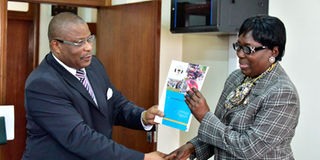Rights body raises flag on rough road to 2016

The chairperson of the Uganda Human Rights Commission (UHRC), Mr Medi Kaggwa, hands over the UHRC 2014 report to the Speaker of Parliament, Ms Rebecca Kadaga, yesterday. Photo by Geoffrey Sseruyange
What you need to know:
Concern. UHRC says delay in passing electoral reforms, restrictive laws, monetisation of politics and uncertainty about national voters’ register are some of the factors that could affect the 2016 election
KAMPALA.
The Uganda Human Rights Commission (UHRC) yesterday joined the chorus of voices warning that next year’s elections may not be free and fair, attracting cries of dismay from the government.
In its 2014 annual report, which was officially handed over to Parliament yesterday, the UHRC notes that the delay in passing of electoral reforms, restrictive laws, monetisation of politics and uncertainty about how the national voters’ register is to be compiled are some of the factors that could affect the poll.
These factors could even lead to violence, the report warned. The government rights watchdog agency warned that there is still “confusion” over how data computed under the national ID project will be used to compile a voters’ register with the report warning that non-Ugandans were registered as citizens during the exercise last year.
“The national ID registration exercise was faced with a number of challenges which are likely to negatively impact on the voters’ register and possibly affect some people’s participation in the forthcoming elections,“ reads the report in part.
“In Rwabenge Sub-county, Kalungu District, there were reports of several foreigners of Rwandan and Tanzanian origin having been registered,” the report said.
Government yesterday reacted with dismay to these findings with government spokesman Ofwono Opondo labelling the report “unfortunate and shallow” while the Attorney General Fred Ruhindi accused UHRC of not “consulting government”.
“It is unfortunate that UHRC...can make such a report. What is motivating them is that they are shallow but want to play to civil society and appear intelligent,” Mr Opondo said.
Mr Ruhindi said: “Had UHRC been privy to, or had they consulted us on the (electoral reform) proposals being discussed in Cabinet, it is unlikely they would have come up with a report like this. It is true the EC had proposed a roadmap leading to 2016 which can be re-aligned to fit the amendments when passed without affecting the roadmap.”
The Commission also put the police on notice over its recruitment of so-called crime preventers, warning that they are “poorly trained yet given powers to do police work”.
“Uganda’s vast unemployed youth if not well handled could be exploited by different political parties to engage in violence,” the report says.
On the electoral reforms, the agency warns that the much needed legislations to guarantee a free poll next year could be passed “when it is too late to have any meaningful effect”.
The caution by the government rights body echoes concerns by Opposition groups and civil society activists that the government is buying time in order to table watered-down versions of reform laws at the last minute which would not ensure a level ground.
The government has been flip-flopping on when it will table the electoral reforms with Premier Ruhakana Rugunda last week backtracking on a promise, saying it would be “erroneous to make false deadlines”.
The agency suggests that the government should consider a recommendation it made following the disputed 2006 and 2011 elections “to review the process of appointing members of the Commission to ensure “greater consensus and acceptance “by political parties, civil society and the voters.




